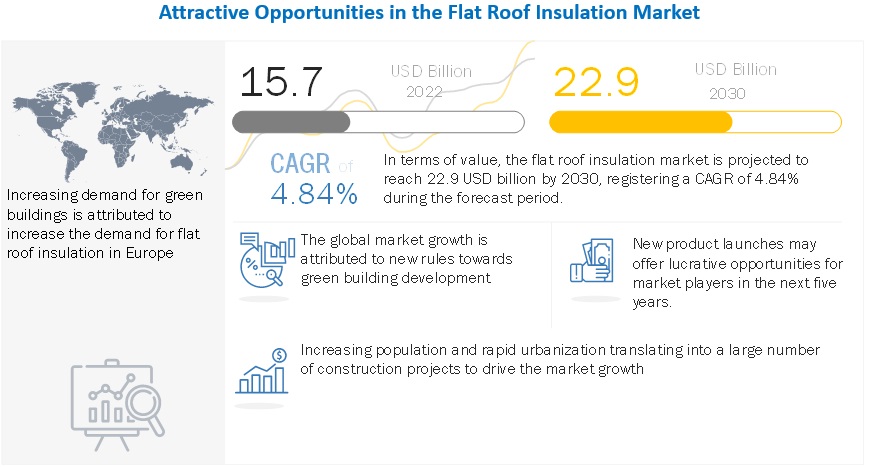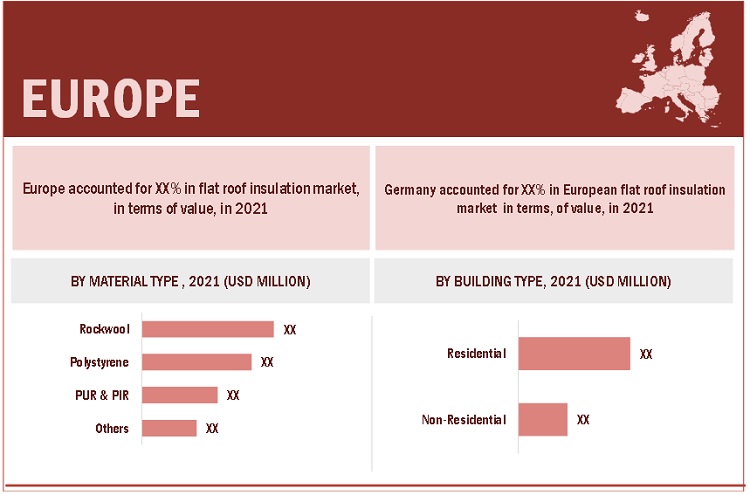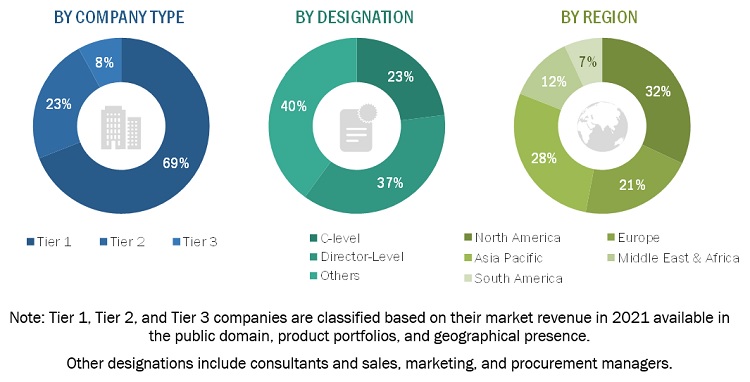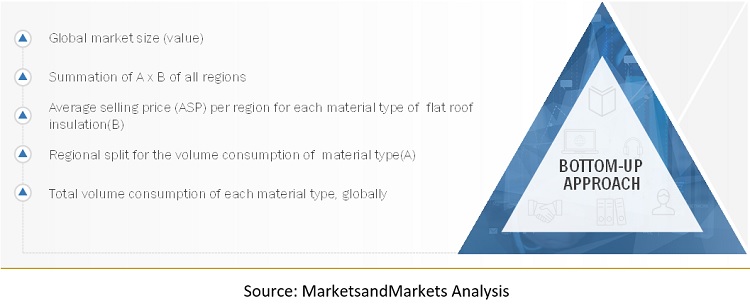Flat Roof Insulation Market by Material Type (Rockwool, Polystyrene, PUR & PIR, Others), Building Type (Residential, Non-Residential) and Region (Europe, North America, Asia Pacific, Middle East & Africa, South America) - Global Forecast to 2030
The flat roof insulation market is projected to reach USD 22.9 billion by 2030, at a CAGR of 4.84% from USD 15.7 million in 2022. The rising reduction in greenhouse gas emission and development of green buildings mainly drives the flat roof insulation market. In addition, the presence of stringent building energy codes in Europe and North America drives the demand for flat roof insulation. Lack of awareness among people is a challenge and availability of green insulation material is the restraining factor for the growth of the flat roof insulation market.

To know about the assumptions considered for the study, Request for Free Sample Report
Market Dynamics
Driver: New rules for green and smart buildings and growing focus on obtaining green certifications
In July 2018, new rules for energy performance in buildings came into effect as part of the Clean Energy. Buildings are responsible for high energy consumption and CO2 emissions, contributing to environmental crisis globally. These new provisions will make buildings greener and more energy-efficient. Green building construction is expected to double in many parts of the world in the near future due to growing environmental concerns across the globe. Green buildings are considered optimal solution as these projects emphasize on sustainability and reduce overall carbon footprint of a structure. Moreover, growing government regulations for a net-zero carbon future to check rising global temperature is driving the construction of green and smart buildings.
Restraints: Volatility in crude oil prices
Many flat roof insulation materials are manufactured from the base materials and also have crude oil as its basis. Furthermore, polystyrene is produced from the crude oil refinery product, styrene. The EPS and XPS manufacturers have been facing challenges in areas such as the supply of raw material, fluctuation in demand, and pricing volatility. Hence, the prices of these materials have a direct impact on the cost of flat roof insulation materials.
Opportunities: Population growth and rapid urbanization translating into a large number of construction projects
According to the United Nations Department of Economic and Social Affairs/Population Division and World Population, the global population is projected to reach 9.5 billion by 2050. The ever-increasing population, as well as the industrial boom after the economic slowdown, has given rise to new constructions in both commercial and residential sectors. Moreover, the migration of the rural population to urban areas and the conversion of towns into cities have further fueled the growth rate of the flat roof insulation market. According to the Population Reference Bureau, China, India, and other Asian countries accounted for a combined population exceeding 4.3 billion in 2018, while the Asia-Pacific Human Development Report published by the United Nations Development Programme projects that the total population in the Asia Pacific would reach 4.84 billion by 2050, of which 64% is projected to be urban population. This is expected to increase the demand for new construction projects over the next two decades owing to the rapidly rising household incomes and the growing middle-class population.
Challenges: Lack of awareness about flat roof insulation
The construction industry is considered to be slow and conservative in adopting innovative and new technologies. The construction sector comprises numerous small suppliers; its R&D budget is also limited in comparison to other sectors. There is a lack of awareness among consumers as well as building professionals about building thermal insulation. The flat roof insulation market has a positive outlook due to the high growth in the construction industry. However, in some developing or underdeveloped countries of Asia Pacific, Africa, and South America, people are less aware of these insulation and the benefits it offers. There is a lack of awareness about the sustainability, flexibility, recyclability, and durability in the emerging economies in Africa and South America.
“Rockwool was the largest material type of flat roof insulation market in 2021, in terms of value”
Rockwool led the flat roof insulation market, in terms of value, in 2021. The growing use of stone wool in large projects which involve the metal roofing membrane drive its demand. Rockwool or stone wool is used widely in flat roof structures. This is because it has advantages in fire resilience, thermal protection and noise reduction. Also, Rockwool can be recycled and this drives its demand in metal roofing structure.
“Residential was the largest building type for flat roof insulation market in 2021, in terms of value”
The residential building segment accounted for the largest share of the building thermal insulation market. This is primarily due to favorable and lenient lending policies initiated by governments across all regions, which drive the sales of residential construction projects. The spending in residential construction is estimated to witness a surge, particularly in the emerging countries of Asia Pacific.
“Europe was the largest market for flat roof insulation in 2021, in terms of value.”
Europe led the flat roof insulation market in 2021, in terms of value. This is due to the stringent building codes existing in the region which has led the building & construction sector to insulate both residential and non-residential sectors. Moreover, severe climatic conditions, and need to insulate the roof has led to the usage of insulation in the roofing structures.

To know about the assumptions considered for the study, download the pdf brochure
Key Market Players
The key players in this market Owens Corning (US), Saint-Gobain (France), Rockwool International A/S (Berlin), Kingspan Group PLC (Berlin), Recticel NV/SA (Belgium), Fibran (Greece) and Unilin (Belgium). Continuous developments in the market—including new product launches, mergers & acquisitions, agreements, and expansions—are expected to help the market grow. Leading manufacturers of flat roof insulation market have opted for new product launches to sustain their market position.
Scope of the Report
|
Report Metric |
Details |
|
Years considered for the study |
2017-2030 |
|
Base Year |
2021 |
|
Forecast period |
2022–2030 |
|
Units considered |
Value (USD Million) |
|
Segments |
Material Type, Building Type, Region |
|
Regions |
Asia Pacific, North America, Europe, Middle East & Africa, and South America |
|
Companies |
The key players in this market are Owens Corning (US), Saint-Gobain (France), Rockwool International A/S (Berlin), Kingspan Group PLC (Berlin), Recticel NV/SA (Belgium),Fibran (Greece), and Unilin (Belgium) |
This report categorizes the global flat roof insulation market based on material type, building type, and region.
On the basis of material type, the flat roof insulation market has been segmented as follows:
- Rockwool
- Polystyrene
- PUR & PIR
- Others
On the basis of building type, the flat roof insulation market has been segmented as follows:
- Residential
- Non-Residential
On the basis of region, the flat roof insulation market has been segmented as follows:
- Asia Pacific
- Europe
- North America
- Middle East & Africa
- South America
Frequently Asked Questions (FAQ):
What is the expected growth rate of flat roof insulation market?
The forecast period for flat roof insulation market in this study is 2022-2030. The flat roof insulation market is projected to grow at CAGR of 4.84%, in terms of value, during the forecast period.
Who are the major key players in flat roof insulation market?
Owens Corning (US), Saint-Gobain (France), Rockwool International A/S (Berlin), Kingspan Group PLC (Berlin), Recticel NV/SA (Belgium), Fibran (Greece) and Unilin (Belgium).
What is the average selling price trend for flat roof insulation market?
Prices are low in Asian countries (primarily China and India) compared to those in Europe and North America due to the low prices of raw materials and the availability of low-cost workforces in Asia Pacific. .
To speak to our analyst for a discussion on the above findings, click Speak to Analyst

Table of content
1 Introduction
1.1 Objective of the study
1.2 Market definition
1.3 Market Scope
1.3.1 Years considered for the study
1.4 Currency
1.5 Unit Considered
1.6 Stakeholders
2 Research Methodology
2.1 Research Data
2.2 Secondary Data
2.2.1 Key data from secondary sources
2.3 Primary Data
2.3.1 Key data from primary sources
2.3.2 Breakdown of Primary Interviews
2.4 Market Size Estimation
2.4.1 Bottom-Up Approach
2.4.2 Top-Down Approach
2.5 Data Triangulation
2.6 Assumptions
2.7 Limitations
3 Executive Summary
4 Premium Insights
4.1 Opportunities in Flat Roof Insulation Market
4.2 Flat Roof Insulation Market, By Material Type
4.3 Flat Roof Insulation Market, By Building Type
4.4 Flat Roof Insulation Market, By Region
5 Market Overview and Industry Trends
5.1 Introduction
5.2 Market Dynamics
5.2.1 Drivers
5.2.2 Restraints
5.2.3 Opportunities
5.2.4 Challenges
5.3 Supply Chain Analysis
5.3.1 Raw Material Manufacturing
5.3.2 Manufacturers
5.3.3 Distribution
5.3.4 End-Use Industry
5.4 Porter’s Five Forces Analysis
5.4.1 Threat of New Entrants
5.4.2 Threat of Substitutes
5.4.3 Bargaining Power of Buyers
5.4.4 Bargaining Power of Suppliers
5.4.5 Intensity of Competitive Rivalry
5.5 Average Selling Price
5.6 Regulatory Landscape
5.7 Industry Outlook
6 Flat Roof Insulation Market, By Material Type
6.1 Introduction
6.2 Rockwool
6.3 Polystyrene
6.4 PUR & PIR
6.5 Others
7 Flat Roof Insulation Market, By Building Type
7.1 Introduction
7.2 Residential
7.3 Non-Residential
8 Flat Roof Insulation Market, By Region
8.1 Introduction
8.2 Asia Pacific
8.2.1 China
8.2.2 India
8.2.3 Japan
8.2.4 South Korea
8.2.5 Rest of Asia Pacific
8.3 North America
8.3.1 U.S.
8.3.2 Canada
8.3.3 Mexico
8.4 Europe
8.4.1 Germany
8.4.2 France
8.4.3 Italy
8.4.4 U.K.
8.4.5 Rest of Europe
8.5 Middle East & Africa
8.5.1 Egypt
8.5.2 Saudi Arabia
8.5.3 South Africa
8.5.4 Rest of Middle East & Africa
8.6 South America
8.6.1 Brazil
8.6.2 Argentina
8.6.3 Rest of South America
9 Competitive Landscape
9.1 Introduction
9.2 Market Share Analysis
9.3 Company Evaluation Quadrant
9.4 Competitive Situation & Trends
9.4.1 New Product Launches
9.4.2 Contracts & Agreements
9.4.3 Partnerships & Collaborations
9.4.4 Joint Ventures
9.4.5 Expansions
10 Company Profile
10.1 Owens Corning
10.1.1 Business Overview
10.1.2 Products Offered
10.1.3 Recent Development
10.1.4 MnM View
10.1.4.1 Key Strengths
10.1.4.2 Strategic choices made
10.1.4.3 Threat from competition
10.2 Saint Gobain
10.3 Rockwool International A/S
10.4 Kingspan Group PLC
10.5 Recticel NV/SA
10.6 Fibran
10.7 Unilin
10.8 Metecno Group
10.9 Atlas Roofing Corporation
10.1 Standard Industries
10.11 List of other key market players
11 Appendix
11.1 Insights from Industry Experts
11.2 Discussion Guide
11.3 Related Reports
The study involved four major activities to estimate the size of flat roof insulation market. Exhaustive secondary research was done to collect information on the market, the peer market, and the parent market. The next step was to validate these findings, assumptions, and sizing with industry experts across the value chain through primary research. Both top-down and bottom-up approaches were employed to estimate the complete market size. Thereafter, the market breakdown and data triangulation procedures were used to estimate the market size of the segments and subsegments.
Secondary Research
In the secondary research process, various secondary sources have been referred to for identifying and collecting information for this study. These secondary sources include annual reports, press releases, investor presentations of companies, white papers, certified publications, trade directories, certified publications, articles from recognized authors, gold standard and silver standard websites, and databases.
Secondary research has been used to obtain key information about the value chain of the industry, monetary chain of the market, the total pool of key players, market classification and segmentation according to industry trends to the bottom-most level, and regional markets. It was also used to obtain information about the key developments from a market-oriented perspective.
Primary Research
The flat roof insulation market comprises several stakeholders in the value chain, which include raw material suppliers, manufacturers, distributors, and end users. Various primary sources from the supply and demand sides of the flat roof insulation market have been interviewed to obtain qualitative and quantitative information.
The primary interviewees from the demand side include key opinion leaders in end-use sectors. The primary sources from the supply side include manufacturers, associations, and institutions involved in the flat roof insulation industry.
The breakdown of profiles of the primary interviewees is illustrated in the figure below:

To know about the assumptions considered for the study, download the pdf brochure
Market Size Estimation
The top-down and bottom-up approaches have been used to estimate and validate the size of the flat roof insulation market.
- The key players in the industry have been identified through extensive secondary research.
- The supply chain of the industry has been determined through primary and secondary research.
- All percentage shares, splits, and breakdowns have been determined using secondary sources and verified through primary sources.
- All possible parameters that affect the markets covered in this research study have been accounted for, viewed in extensive detail, verified through primary research, and analyzed to obtain the final quantitative and qualitative data.
- The research includes the study of reports, reviews, and newsletters of the key market players, along with extensive interviews for opinions with leaders such as directors and marketing executives.
FLAT Roof Insulation Market: Bottom-Up Approach 1

To know about the assumptions considered for the study, Request for Free Sample Report
Data Triangulation
After arriving at the total market size from the estimation process explained above, the overall market has been split into several segments and sub-segments. To complete the overall market engineering process and arrive at the exact statistics for all the segments and sub-segments, the data triangulation and market breakdown procedures have been employed, wherever applicable. The data has been triangulated by studying various factors and trends from both the demand and supply sides. Along with this, the market size has been validated by using both the top-down and bottom-up approaches and primary interviews. Hence, for every data segment, there have been three sources—top-down approach, bottom-up approach, and expert interviews. The data was assumed correct when the values arrived from the three sources matched.
Report Objectives
- To define, describe, and forecast the size of the flat roof insulation market, in terms of value
- To provide detailed information regarding the major factors (drivers, opportunities, restraints, and challenges) influencing the growth of the market
- To estimate and forecast the market size based on material type, building type and region
- To forecast the size of the market with respect to major regions, namely, Europe, North America, Asia Pacific, and Middle East & Africa, and South America along with their key countries
- To strategically analyze micromarkets1 with respect to individual growth trends, prospects, and their contribution to the overall market
- To analyze opportunities in the market for stakeholders and provide a competitive landscape of market leaders
- To track and analyze recent developments such as expansions, new product launches, partnerships & agreements, and acquisitions in the market
- To strategically profile key market players and comprehensively analyze their core competencies2
Available Customizations
Along with the given market data, MarketsandMarkets offers customizations according to the company’s specific needs. The following customization options are available for the report:
Regional Analysis
Further breakdown of a region with respect to a particular country or additional application
Company Information
Detailed analysis and profiles of additional market players















Growth opportunities and latent adjacency in Flat Roof Insulation Market